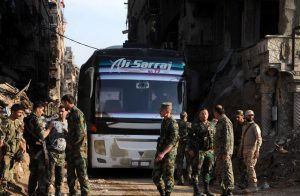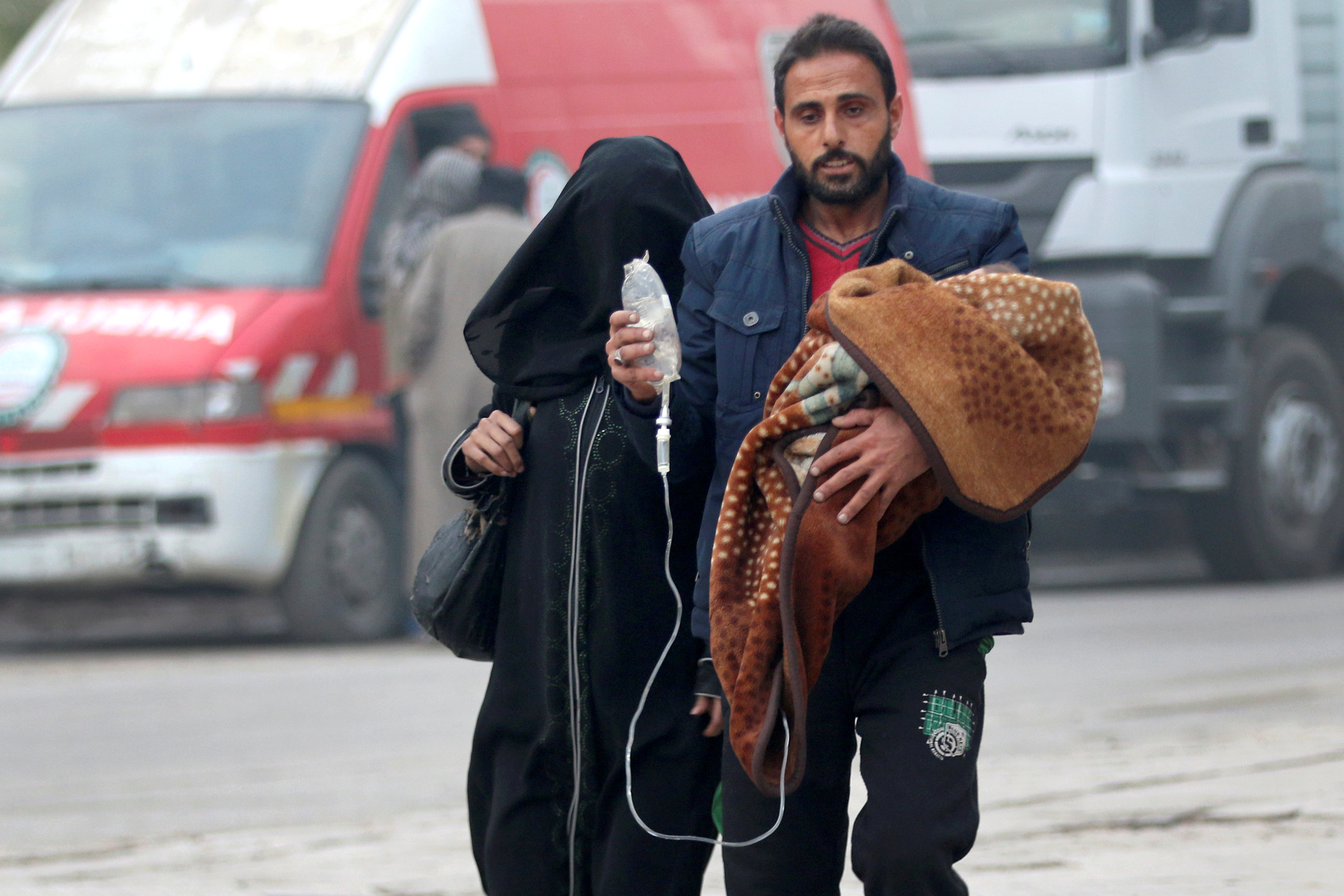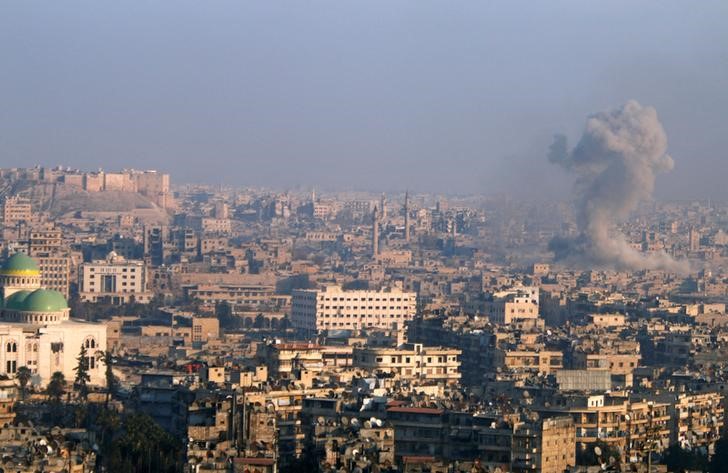
By Suleiman Al-Khalidi
AMMAN (Reuters) – After Syrian forces bombed the town of Douma earlier this month in an attack the United States says involved chlorine gas, Washington and its allies launched missile strikes as punishment.
The retribution has changed little in the course of the seven-year civil war, but the alleged poison gas attack did.
Rebels had held the stronghold of Douma, near the capital Damascus, for years despite repeated offensives. Within hours of the April 7 attack they were in retreat.
Under pressure from beleaguered residents and facing Russian threats of further such attacks, the rebel group Jaish al-Islam finally agreed to surrender Douma and leave for the Turkish border, Mohammad Alloush, a top official in the movement, said.
By the time the West struck back just under a week later, armed resistance in the areas around the Syrian government’s seat of power had all but collapsed, further strengthening the hand of President Bashar al-Assad.
Syria and Russia condemned the Western military intervention early on Saturday, and deny the use of chemical weapons in Douma.
Moscow branded it a lie concocted with the help of Britain, while the British government said a significant body of information, including intelligence, indicated the Syrian government was responsible.
Whatever happened on that day, it prompted a dramatic shift on the ground.
Medical relief groups said dozens of civilians were killed, and one video circulated by activists showed the bodies of around a dozen men, women and children lifeless on the floor, some of them with foam at the mouth.
A couple of hours later, according to Alloush, mediators from the rebel group held talks with a team led by a senior officer from the Russian defence ministry.
“The threat came: ‘You saw what happened in Douma. Now you can only sign, or there will be more strikes and nobody left in the town’,” Alloush, who is based in Istanbul, told Reuters.
He blamed Russia for helping the Syrian army carry out the attack in order to end the rebellion.
“They bombed and bombed and we weren’t defeated by conventional weapons so they found the only way was to use chemical (weapons).”
The Russian defence ministry did not respond to detailed questions about Alloush’s comments sent by Reuters.
After talking with the Russians, Jaish al-Islam members then met a civilian council representing Douma residents: tens of thousands have stayed on despite the fighting that has reduced much of the town to rubble.
The residents’ message to the rebels was clear: “They said ‘we can no longer hold on. If you don’t leave, we are going over to the regime’,” said Alloush. “Civilian morale collapsed with the scenes of death.”
A council member who declined to be named told Reuters that civilians said they could no longer resist, given the threat of further attacks.
Dozens of people had been killed under intense bombardment the day before poison gas was allegedly deployed, but there was a difference, Alloush said.
“Chemical weapons create more terror.”
ESCALATING TENSIONS
Syria’s civil war has been going Assad’s way since Russia intervened on his side in 2015.
After the key capture of eastern Aleppo in late 2016, Assad and his allies have taken back one area after another from rebels who face Russian air power and lack sufficient aid from foreign states that back them only half-heartedly.
Significant areas of Syria still remain beyond the president’s grasp, including nearly all of the north, much of the east, and a chunk of the southwest, areas where foreign interests will complicate further gains.
But in the region around the capital he has made big gains. Eastern Ghouta fell last month, leaving Douma as the last major rebel bastion.
Its fall – insurgent fighters have been bussed towards the Turkish border over the past few days – marks another milestone.
The Ghouta offensive was directed from the start by Russia and waged on the ground by elite Syrian forces, according to a commander in the regional military alliance that backs Assad.
When the assault got underway in February, the besieged area was pounded from the ground and air before troops thrust in. So far, the Ghouta offensive has killed more than 1,700 civilians, the Syrian Observatory for Human Rights said.
Hamstrung by rivalries and weakened by the “scorched earth” bombardment, the handful of eastern Ghouta rebel groups were steadily defeated and forced to accept safe passage to opposition-held territory at the Turkish border.
Jaish al-Islam, however, believed it could avoid the same fate even as Syrian troops encircled Douma, saying it wanted to protect the town and its people from forced displacement imposed by the Assad government.
CIVILIANS FLEE
Once the biggest rebel group in eastern Ghouta, Jaish al-Islam claimed to have fortified Douma extensively, meaning government forces could face a costly battle to capture it.
The group also said it could have held out thanks to weapons factories it built up during the war and enough supplies to feed people for a year.
Hundreds of thousands of residents had already fled the area in the years and months preceding April 7, but tens of thousands stayed.
In negotiations with Russian military personnel, Jaish al-Islam pressed for a deal that would let in Russian military police, keep out the Syrian military and allow its fighters to stay as a local security force.
Alloush said the talks appeared to be going well two days before the suspected chemical attack, with the Russians having promised to study fresh proposals.
But, he said, Russia’s response the following day was a threat: face chemical attacks or leave to northern Syria.
That afternoon the most ferocious bombardment yet was unleashed on Douma. Thick clouds of dark smoke rose from the town in a live state TV broadcast.
The government accused Jaish al-Islam of shelling residential areas of Damascus and reneging on promises to release abducted soldiers and civilians held by the group.
The rebels denied opening fire.
“We were fighting the Russians. We were not fighting the regime,” Alloush said.
“THE RUSSIANS GOT ANGRY”
The pro-Assad commander who declined to be named said the army had been mobilized on April 6 in preparation for a possible assault, after Jaish al-Islam reneged on an agreement to leave the town and introduced unacceptable demands.
These included its legalization as a political party, and a requirement that the Syrian army stay out of Douma. The Russians were furious, according to the pro-Assad commander.
“The Russians got very angry with them … and asked them ‘what are these impossible conditions’?”
The Syrian government’s position was clear, the commander said. The rebels must go “to Jarablus”, a town at the Turkish border.
Sources in the rebel group, however, said that talks with the Russians had been about the terms of them staying in Douma, not about conditions of a withdrawal.
The ensuing onslaught smashed Jaish al-Islam’s defensive lines, according to both Alloush and the pro-Assad commander.
As the air strikes continued, Alloush reiterated Jaish al-Islam’s demand that it be allowed to stay in Douma to protect its people.
The next evening, more than 500 people, mostly women and children, began arriving at medical centers in Douma showing symptoms consistent with exposure to a chemical agent, according to Syrian American Medical Society, a relief organization.
“Following the chemical attack, the target site and the surrounding area of the hospital receiving the injured were attacked with barrel bombs, which hindered the ability of the ambulances to reach the victims,” it said.
Hours later, the rebels began to withdraw.
GRAPHIC: Overview of chemical warfare, click http://tmsnrt.rs/2pKDWOY
(Additional reporting by Stephen Kalin in Riyadh, Laila Bassam, Tom Perry and Ellen Francis in Beirut and Christian Lowe in Moscow; Writing by Tom Perry; Editing by Mike Collett-White)












